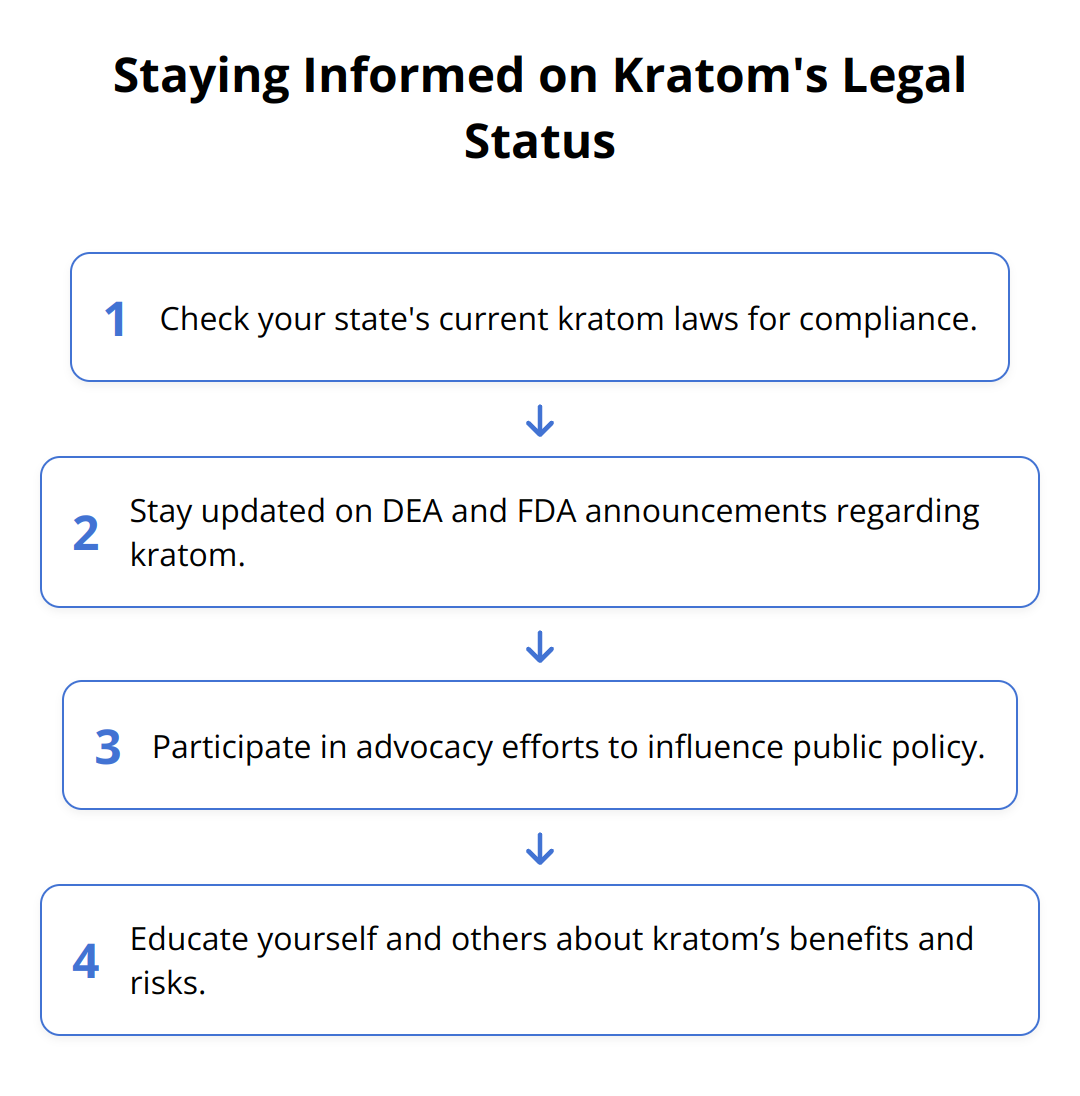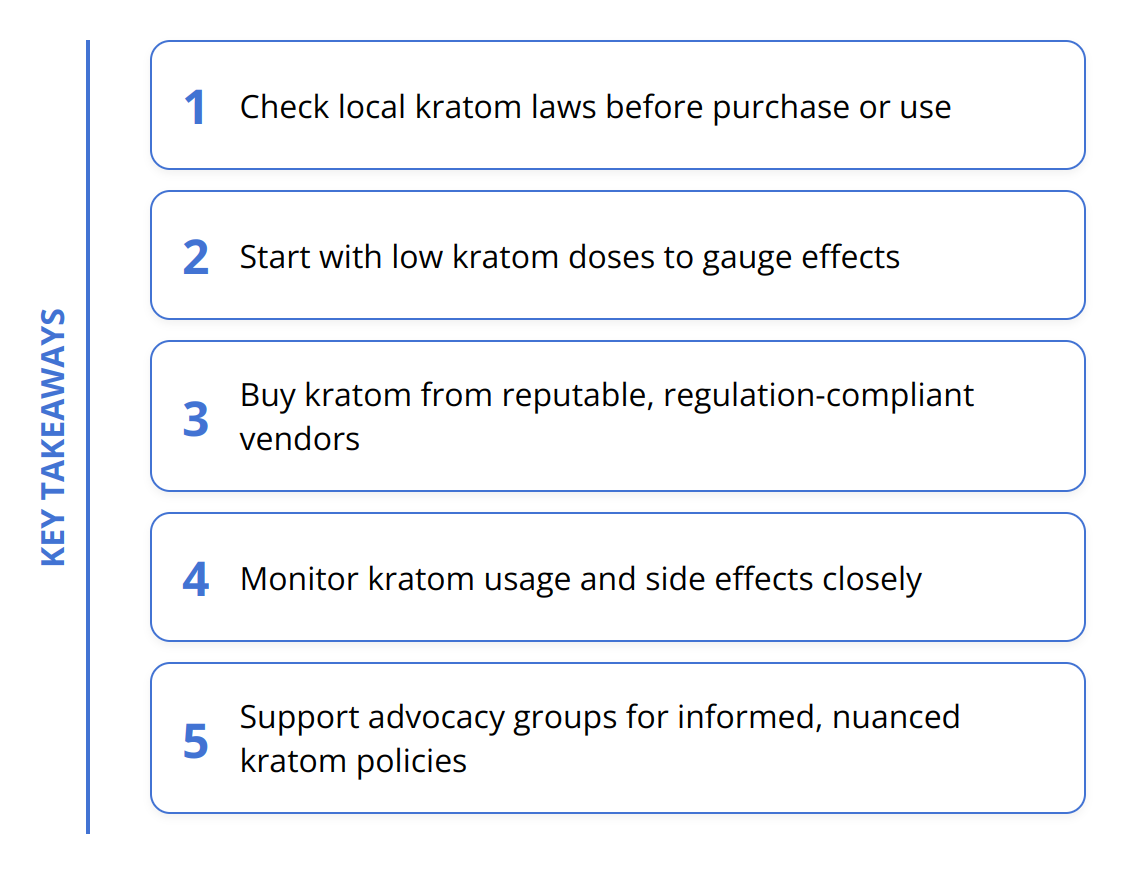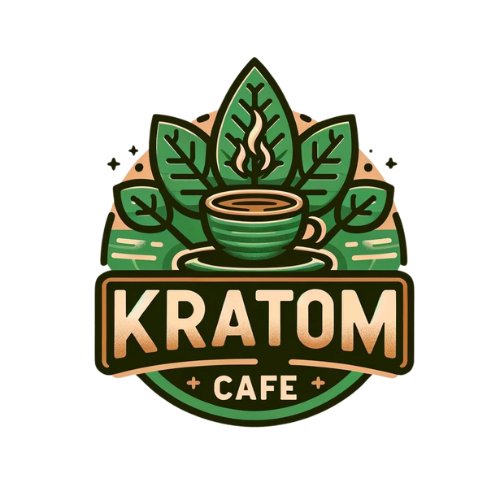Kratom, a botanical substance known for its unique properties, has sparked discussions around its legal status across the globe. We at Kratom Cafe are here to navigate the complex landscape of regulations, spotlighting where and why it varies. From country-specific laws to the pivotal role of various regulatory bodies, understanding kratom’s legal standing is essential. This post aims to provide clarity and insights for both users and sellers, highlighting the factors that influence kratom’s legal terrain.
Kratom’s Uses and Safety Insights
Kratom, a tropical tree native to Southeast Asia, has been gaining attention for its potential benefits and risks. This chapter provides insights into kratom’s common uses, public perception, and emerging safety concerns. By engaging with recent data and practical advice, we aim to shed light on the critical aspects of kratom consumption and regulation.
Overview and Common Uses of Kratom
Extracted from the leaves of the Mitragyna speciosa plant, kratom contains compounds mitragynine and 7-hydroxymitragynine. These substances interact with opioid receptors in the brain, which explains both the health benefits and the risks associated with kratom use. Predominantly, kratom is utilized for its capacity to alleviate pain, boost energy, and assist in managing withdrawal symptoms from opioids. Its effects vary significantly with dose: lower quantities tend to stimulate, while higher doses create sedative effects.
Kratom’s versatility has led to its popularity as a herbal supplement. People consume it in various forms – as a tea, powdered leaf, or capsule. Its benefits include:
-
Pain relief
-
Enhanced mood and anxiety reduction
-
Increased focus and energy
-
Opiate withdrawal relief

Public Perception and Safety Concerns
Despite its benefits, kratom is not without controversy. The legal status of kratom remains a contentious issue, fuelled by concerns over safety, potential for abuse, and lack of standardization. Reported adverse effects include nausea, itchiness, dry mouth, and in severe cases, seizures, and psychosis. As a result, regulatory bodies and the medical community continue to debate the balance between kratom’s potential as a therapeutic agent and its risks.
Public perception of kratom varies widely. Advocates emphasize its effectiveness as a natural remedy and a safer alternative to prescription opioids. Critics, however, point to the lack of comprehensive research and regulatory oversight as significant barriers to its acceptance. The divide is also evident in the legal landscape; while some states and countries have embraced kratom, imposing regulations to ensure safety, others have banned it outright.

Given the polarized views on kratom, consumers must stay informed and exercise caution. Here are practical tips for those considering kratom:
-
Research local laws regarding kratom in your area
-
Start with low doses to assess tolerance and effects
-
Purchase from reputable sources to avoid contaminated products
-
Monitor usage and be aware of potential side effects
For detailed guidance on using kratom safely, consider exploring resources like how to use kratom and kratom tea benefits.
As the conversation around kratom continues, it’s vital to prioritize safety, transparency, and research. Understanding kratom’s uses, navigating public perceptions, and addressing safety concerns are essential steps towards responsible consumption and informed decision-making.
Navigating Kratom’s Legal Status
Navigating the legal status of kratom worldwide unveils a complex and fragmented regulatory landscape. The difference in legal perspectives reflects not only cultural attitudes but also the varied responses of governments to kratom’s health implications. Understanding where and why kratom is legal or banned is vital for both consumers and retailers to avoid inadvertently breaking the law.
Global Legal Perspectives on Kratom
In the United States, kratom legality is a patchwork of state regulations, with some states imposing bans while others regulate its sale and use. For instance, Alabama, Arkansas, Indiana, Rhode Island, Vermont, and Wisconsin have classified kratom as a controlled substance, making its sale and use illegal. On the flip side, states like Florida and New York allow kratom with specific regulations designed to protect consumers, such as age restrictions and labeling requirements.
Moving beyond the U.S., kratom’s legal status varies significantly. It is entirely illegal in countries like Australia, Denmark, Malaysia, and Thailand, although Thailand has recently moved towards legalizing kratom for medicinal purposes, reflecting a changing attitude towards its potential benefits.
Conversely, kratom remains legal and relatively unregulated in much of Europe, although specific countries like Italy and the United Kingdom have imposed bans or tight restrictions. The disparity in legal views globally underscores the importance of staying informed and compliant with local laws.
Factors Influencing Legal Decisions
Several key factors underpin the diverse legal decisions on kratom:
- Public Health Concerns: Many bans stem from concerns over potential abuse, addiction, and health risks. Reports of adverse effects have led some regulators to err on the side of caution, limiting or banning kratom use.
- Lack of Standardization: The absence of standardized dosages and formulations complicates the safe use of kratom, driving some countries to restrict its sale and consumption.
- Potential Therapeutic Uses: On the other hand, the debate over kratom’s legal status is softened by its potential for opioid withdrawal aid and pain management. Advocacy by users and some healthcare professionals highlights its value in certain therapeutic contexts.
- Impact of Advocacy and Research: Public and scientific advocacy efforts can influence kratom legislation, as seen in the DEA’s reversal of its decision to schedule kratom as a controlled substance in the U.S. due to public outcry and advocacy.

For users and enthusiasts, understanding these factors can shed light on the complex legal landscape and guide responsible kratom use. Here are practical steps to ensure compliance and safety:
-
Always check local laws before purchasing or consuming kratom.
-
Purchase kratom from reputable vendors who comply with regulations in their regions.
-
Stay informed about changes in kratom’s legal status by following reliable sources or joining advocacy groups.
For further reading on making informed kratom choices, exploring resources like selecting kratom can provide valuable insights.
Despite the divisive views on kratom, the evolution of its legal status in various jurisdictions reflects an ongoing negotiation between safety concerns and potential health benefits. As research into kratom’s effects and safe use continues, we may see shifts in legal attitudes. Supporters and critics alike advocate for a balanced approach, emphasizing the importance of informed, safe use, and adherence to local regulations.
Legal Hurdles for Kratom in the USA
The legal landscape of kratom in the United States is a convoluted mix of state-specific regulations, federal agency scrutiny, and ongoing public discourse. Navigating this terrain requires a keen understanding of the roles that various entities play and how advocacy and public opinion are shaping the future of kratom’s legality.
State-Specific Regulations and Bans
The United States does not have a uniform policy on kratom, making its legal status highly dependent on individual state laws. Some states have embraced kratom, regulating its sale and use to ensure public safety. In contrast, others have implemented outright bans due to concerns about potential abuse and health risks. For instance, Alabama and Wisconsin classify kratom as a controlled substance, while Florida and New York have specific regulations to protect consumers.
Here’s what you need to do:
-
Check your state’s stance: Before purchasing or using kratom, verify your state’s current laws to ensure compliance.
-
Understand local regulations: Even in states where kratom is legal, there may be local ordinances affecting its sale and use.
The Role of the DEA and FDA in Kratom Regulation
The Drug Enforcement Administration (DEA) and Food and Drug Administration (FDA) play critical roles in the federal oversight of kratom. Historically, both agencies have expressed concerns about kratom’s safety and potential for abuse. In particular, the DEA has considered classifying kratom as a Schedule I controlled substance, a designation that would impose significant restrictions on its availability. However, public backlash and advocacy have thus far prevented such a classification.
The FDA, on its part, has not approved kratom for any medical use and frequently warns consumers about its potential health risks. The agency’s stance strongly influences state law and public perception, often serving as a basis for stricter regulations or bans at the state level.
What to keep in mind:
-
Stay informed: Regulatory positions and policies can change, so it’s important to stay updated on DEA and FDA announcements regarding kratom.
-
Understand the implications: Federal decisions have a significant impact on how states regulate kratom, affecting availability and legal use.
Advocacy Efforts and Public Opinion
Advocacy groups play a pivotal role in the kratom debate, often challenging proposed bans and regulations. These organizations work to highlight kratom’s potential benefits, particularly for pain management and opioid withdrawal, and advocate for regulated, rather than prohibited, use. Public opinion is deeply divided, with passionate arguments on both sides of the debate. These dynamics influence policymakers and have led to notable successes in reversing or preventing bans at both state and federal levels.
How to get involved:
-
Support advocacy groups: Participating in advocacy efforts can help influence public policy and promote a more nuanced understanding of kratom.
-
Educate yourself and others: Becoming knowledgeable about kratom’s effects, benefits, and risks allows for informed discussions and decisions.
The battle over kratom’s legal status in the United States is ongoing, with the balance between safeguarding public health and ensuring access to potentially beneficial herbal supplements at its heart. Staying informed, understanding the regulatory landscape, and participating in advocacy can empower users and supporters to navigate these challenges effectively.

Final Thoughts
Navigating the complex and evolving landscape of kratom’s legal status highlights the importance of staying informed and vigilant. Across different states and countries, the legal stance on kratom varies greatly, impacting users and sellers alike. It’s clear that while some regions embrace kratom under regulated frameworks, others view it through a lens of caution, citing public health concerns and safety issues. This disparity underscores the critical need for ongoing research and dialogue among all stakeholders in the kratom community.

For those of us at Kratom Cafe, advocating for clarity, safety, and the therapeutic potential of kratom remains a paramount concern. We’ve seen firsthand the benefits that many users report, from pain management to aid in opioid withdrawal. However, we also recognize the valid concerns regarding kratom’s safety profile and potential for misuse.
As we move forward, several points are crucial for both users and sellers:
-
Staying updated with local and international laws is essential to ensure compliance and avoid legal complications. This understanding helps protect consumers and businesses alike.
-
Engaging with reputable sources like Kratom Cafe can enhance your knowledge base, providing insights into kratom’s diverse impacts and legal nuances.
-
Supporting research and advocacy efforts can contribute to a more balanced and evidence-based approach to kratom regulation. By promoting informed discussions and policy-making, we can work towards a future where the benefits of kratom are accessible within a framework that prioritizes consumer safety and well-being.
Looking ahead, the future of kratom regulation is bound to be shaped by further scientific inquiry, public discourse, and legislative review. The potential for kratom to serve as a beneficial resource is significant, yet its realization hinges on addressing the valid concerns surrounding its use. At Kratom Cafe, we remain committed to providing our community with the latest information, supporting safe and informed kratom use, and advocating for responsible regulation. By fostering a well-informed community, we believe we can navigate the challenges and opportunities that kratom presents together.

